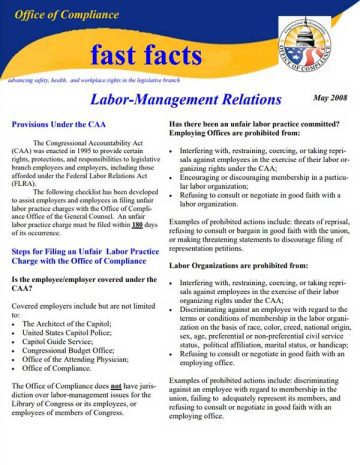Provisions Under the CAA
TThe Congressional Accountability Act (CAA) was enacted in 1995 to provide certain rights, protections, and responsibilities to legislative branch employees and employers, including those afforded under the Federal Labor Relations Act (FLRA).
The following checklist has been developed to assist employers and employees in filing unfair labor practice charges with the Office of Compliance Office of the General Counsel. An unfair labor practice charge must be filed within 180 days of its occurrence.
Steps for Filing an Unfair Labor Practice Charge with the Office of Compliance
Is the employee/employer covered under the CAA?
Covered employers include but are not limited to:
- The Architect of the Capitol;
- United States Capitol Police;
- Capitol Guide Service;
- Congressional Budget Office;
- Office of the Attending Physician;
- Office of Compliance.
The Office of Compliance does not have jurisdiction over labor-management issues for the Library of Congress or its employees, or employees of members of Congress.
Has there been an unfair labor practice committed?
Employing Offices are prohibited from:
- Interfering with, restraining, coercing, or taking reprisals against employees in the exercise of their labor organizing rights under the CAA;
- Encouraging or discouraging membership in a particular labor organization;
- Refusing to consult or negotiate in good faith with a
- labor organization.
Examples of prohibited actions include: threats of reprisal, refusing to consult or bargain in good faith with the union, or making threatening statements to discourage filing of representation petitions.
Labor Organizations are prohibited from:
- Interfering with, restraining, coercing, or taking reprisals against employees in the exercise of their labor organizing rights under the CAA;
- Discriminating against an employee with regard to the terms or conditions of membership in the labor organization on the basis of race, color, creed, national origin, sex, age, preferential or non-preferential civil service status, political affiliation, marital status, or handicap;
- Refusing to consult or negotiate in good faith with an employing office.

